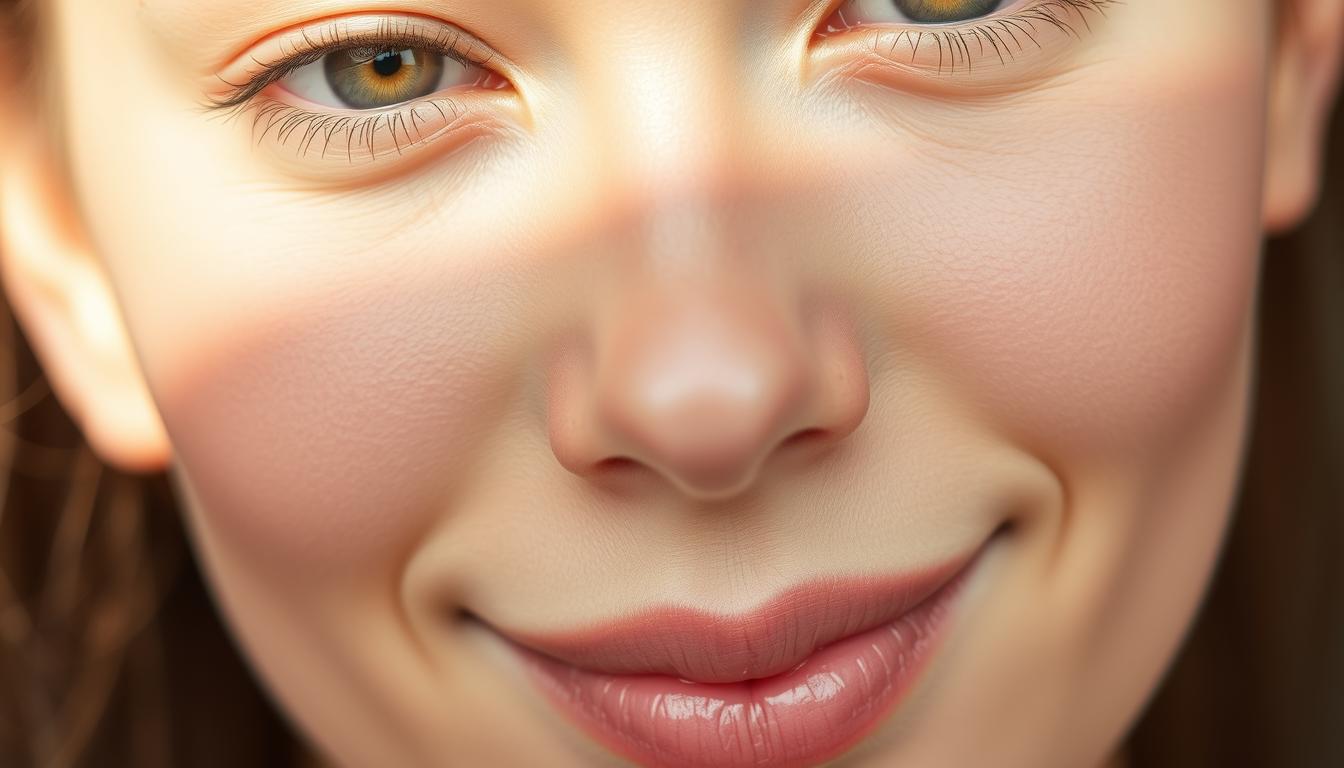Every beauty routine aims for a radiant complexion. It’s the foundation of all beauty. For many women, glowing skin is more than looks—it’s about feeling confident and alive.
Customizing your skin care can reveal the secrets to lasting radiance. This guide will share the best tips and recommendations. We’ll focus on what it truly means to have glowing skin.
Key Takeaways
- Understanding individual skin needs is key for a radiant complexion.
- Daily skin care should be a ritual for the best results.
- Natural ingredients can boost your skin’s glow.
- Hydration, diet, and sun protection are essential for glowing skin.
- Exercise and professional treatments can improve skin health and radiance.
The Importance of a Skincare Routine

Having a skincare routine is more than just looking good. It’s a way to take care of yourself and feel better. Knowing your skin type and adjusting your routine is key to keeping your skin healthy. It’s important to choose the right products and steps, whether it’s for everyday use or seasonal changes.
Understanding Your Skin Type
Starting a good skincare routine begins with knowing your skin type. Is it oily, dry, combination, or sensitive? This helps you pick the right products and create a routine that works for you.
Essential Steps for Morning and Night
Dermatologists say a consistent routine is vital for both morning and night. Start with a cleanser and moisturizer to hydrate and protect. In the morning, add sunscreen to block UV rays. At night, use repair products like retinoids or serums to help your skin heal while you sleep.
Adjusting Your Routine Seasonally
Seasonal changes mean your skincare needs to change too. In hot months, use lighter lotions or serums. In cold months, switch to richer creams. These changes help your skin stay balanced and protected all year.
Natural Ingredients for Radiant Skin
Choosing natural skincare is more than a trend. It’s a lasting way to get a bright, healthy look. Nature’s ingredients give us antioxidants, boost hydration, and brighten our skin. Let’s look at some top natural ingredients that science supports.
The Power of Antioxidants
Antioxidants fight off free radicals, stopping cell damage. Natural sources like vitamin E and green tea extract are top choices. The Skin Cancer Foundation says these antioxidants protect us from environmental harm that causes early aging.
- Aloe Vera: Aloe vera soothes and hydrates the skin well. It’s great for all skin types, adding moisture without feeling greasy.
- Hyaluronic Acid: Found naturally in the skin, hyaluronic acid holds moisture and adds volume. The International Journal of Research in Pharmacy and Chemistry found it boosts skin hydration and elasticity a lot.
Brightening Agents: Vitamin C and Licorice Root
Vitamin C is a big hit in skincare. It’s known for its antioxidant benefits and brightening the skin. It helps reduce dark spots and smooths the skin’s surface. Licorice root, as seen in Clinical, Cosmetic and Investigational Dermatology, also lightens dark spots and evens out skin tone.
Hydration: The Foundation of Glowing Skin
Getting a radiant complexion starts with skin hydration. It’s key for skin health, affecting its elasticity and clarity. Experts, like those at the Mayo Clinic, say drinking water and using moisturizers are essential.
Your skincare routine should focus on skin hydration. This means picking the right hydrating products and drinking enough water. Drinking water helps your body keep moisture in, making your skin stronger against the environment.
Moisturizing tips are also important. Using moisturizers after showering or washing your face keeps moisture in. This helps your skin stay hydrated from the inside and outside.
Ignoring skin hydration can lead to dry, flaky skin. This not only feels bad but also makes wrinkles and fine lines worse. On the other hand, hydrated skin looks healthy and vibrant.
Working on skin hydration from both inside and out makes your skin stronger. It helps your skin deal with aging and environmental damage better.
Maintaining a Healthy Diet for Radiant Skin
Getting radiant, glowing skin is not just about skincare products. It’s also about what you eat. A balanced diet with the right nutrients is essential. Studies in The Journal of Clinical and Aesthetic Dermatology show how diet can change your skin’s look and health.
Choosing the right foods is key for glowing skin. Avoiding high sugars and fats is important. Let’s see how different foods can help or harm your skin’s glow.
Superfoods for Skin Health
Superfoods are full of antioxidants, vitamins, and minerals. They help keep your skin elastic and hydrated. Foods like berries, nuts, and green leafy veggies are great for this. They fight off free radicals and slow down aging.
The Impact of Sugars and Fats on Your Skin
Superfoods are good, but too much sugar and fat are bad. Harvard Health says too much sugar can make your skin age faster. It can also cause acne. Unhealthy fats increase oxidative stress, which harms your skin.
| Superfood | Key Nutrients | Benefits |
|---|---|---|
| Blueberries | Vitamins C and K, Antioxidants | Combats aging and boosts skin radiance |
| Almonds | Vitamin E, Omega-3 Fatty Acids | Supports skin hydration and repair |
| Spinach | Vitamins A, C, E, and K | Enhances skin tone and texture |
To keep your skin looking its best, eat a balanced diet. Include superfoods and limit sugars and fats. This way, you support your skin’s health and beauty from the inside.
Protecting Your Skin from the Sun
Keeping your skin healthy is all about sun protection. Using a broad-spectrum sunscreen protects your skin from harmful UV rays. This helps prevent early aging and lowers skin cancer risk. It’s vital to know about SPF benefits and sunscreen selection for good skin care.
Wearing sunscreen daily is a must. It keeps your skin safe, even on cloudy days. This habit helps avoid UV damage’s long-term effects.
Choosing the right sunscreen is key to protecting your skin. Look for one that blocks both UVA and UVB rays, known as broad-spectrum. Make sure it has an SPF of at least 30, blocking about 97% of UVB rays. For sensitive skin or more sun time, consider higher SPF options.
There are more ways to protect your skin from the sun. Wearing protective clothes like hats, sunglasses, and long-sleeved shirts helps. Also, staying in the shade from 10 a.m. to 4 p.m. cuts down UV exposure a lot.
- Use a shot glass-sized amount of sunscreen for your whole body every two hours or after swimming or sweating.
- Find sunscreens that fit your skin type, including water-resistant ones for swimmers and athletes.
- Reapply sunscreen often to keep SPF benefits all day, if you’re outside a lot.
By adding these sun protection steps to your daily routine, you can safely enjoy the outdoors. Remember, the best way to protect your skin is to use sunscreen regularly and follow other sun-safe habits.
The Role of Exercise in Skin Health
Exercise and skin health are closely linked. Regular exercise for skin can make your skin look better and stay healthy. Studies show that skin benefits of physical activity are real and important, not just for looks.
Doing the right workout glowing skin routine helps your blood flow. This is key for feeding your skin cells. More blood means more oxygen and nutrients, helping your skin fight off damage from pollution and the sun.
| Benefits | Description |
|---|---|
| Enhanced Oxygenation | Boosts via blood flow during physical activity, leading to improved skin cell health. |
| Detoxification | Exercise promotes sweating, which clears pores of accumulated dirt and oils. |
| Collagen Production | Physical activity can enhance the production of collagen, vital for skin elasticity and youthfulness. |
Adding exercise to your routine is good for your body and your skin. It helps keep your skin looking young and healthy. So, think of exercise as a key part of your skin care routine, not just for fitness.
Professional Treatments and When to Consider Them
Exploring professional skin treatments can greatly benefit your skin. Experts from the International Dermal Institute and top organizations like the American Society for Dermatologic Surgery share their insights. They talk about the power of facials, the science of chemical peels, and the appeal of non-invasive procedures.
Facials and Their Benefits
Facials are more than just a luxury—they’re a skincare essential. They clean pores, speed up skin cell turnover, and keep skin hydrated. For those new to treatments, a facial is a great starting point for a customized skincare plan.
Understanding Chemical Peels
Chemical peels are key in dermatology for tackling issues like dark spots, fine lines, and acne. They use a chemical solution to remove old skin and reveal new, healthier layers. Despite their strength, peels can greatly improve skin texture and color.
The Rising Popularity of Non-Invasive Procedures
The trend towards non-invasive skin procedures is growing in cosmetic dermatology. These treatments are loved for their quick recovery and visible results. Options like laser treatments, microdermabrasion, and light therapy are popular for their accuracy and fast healing times.
Here’s a comparison of these treatments:
| Treatment Type | Primary Benefits | Recommended Frequency |
|---|---|---|
| Facials | Cleansing, Hydrating, Anti-Aging | Monthly |
| Chemical Peels | Skin Rejuvenation, Treat Pigmentation | Every 4-6 weeks |
| Non-Invasive Procedures | Minimal Downtime, Targeted Treatments | Varies by Procedure |
Choosing the right treatment depends on your skin, lifestyle, recovery time, and goals. A skincare expert can help you find the best treatment for your needs.
Conclusion
Your skincare journey shows your commitment to glowing skin. We’ve covered key steps for skin health, from a good skincare routine to eating right. Using natural ingredients is a great way to keep your skin healthy and vibrant.
Remember, staying hydrated and using SPF are essential for a bright face. A mix of diet, exercise, and treatments helps keep your skin in top shape. This approach supports your skin at every life stage.
Every tip here is meant to boost your confidence in your beauty routine. Knowing about skin differences, like those found in a study on skin biology, can help you choose better products. Your dedication to self-care will shine through in your skin’s glow. May you radiate health and happiness as you follow these tips.




